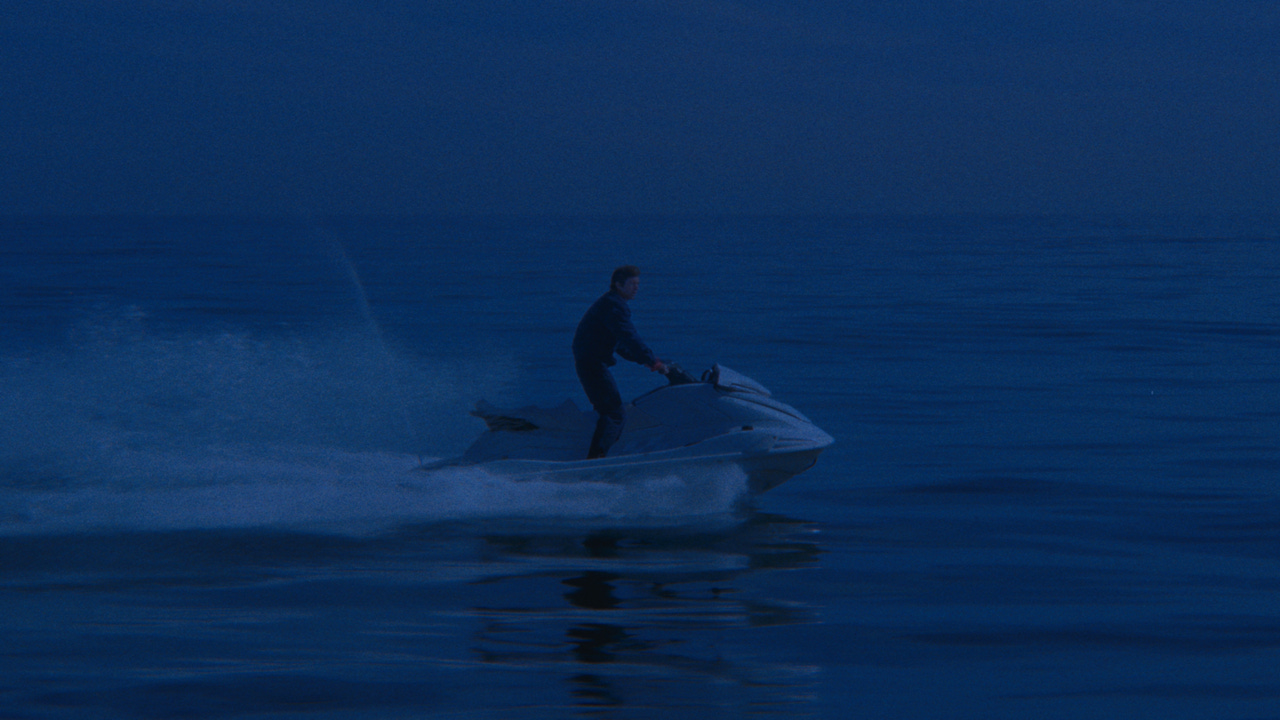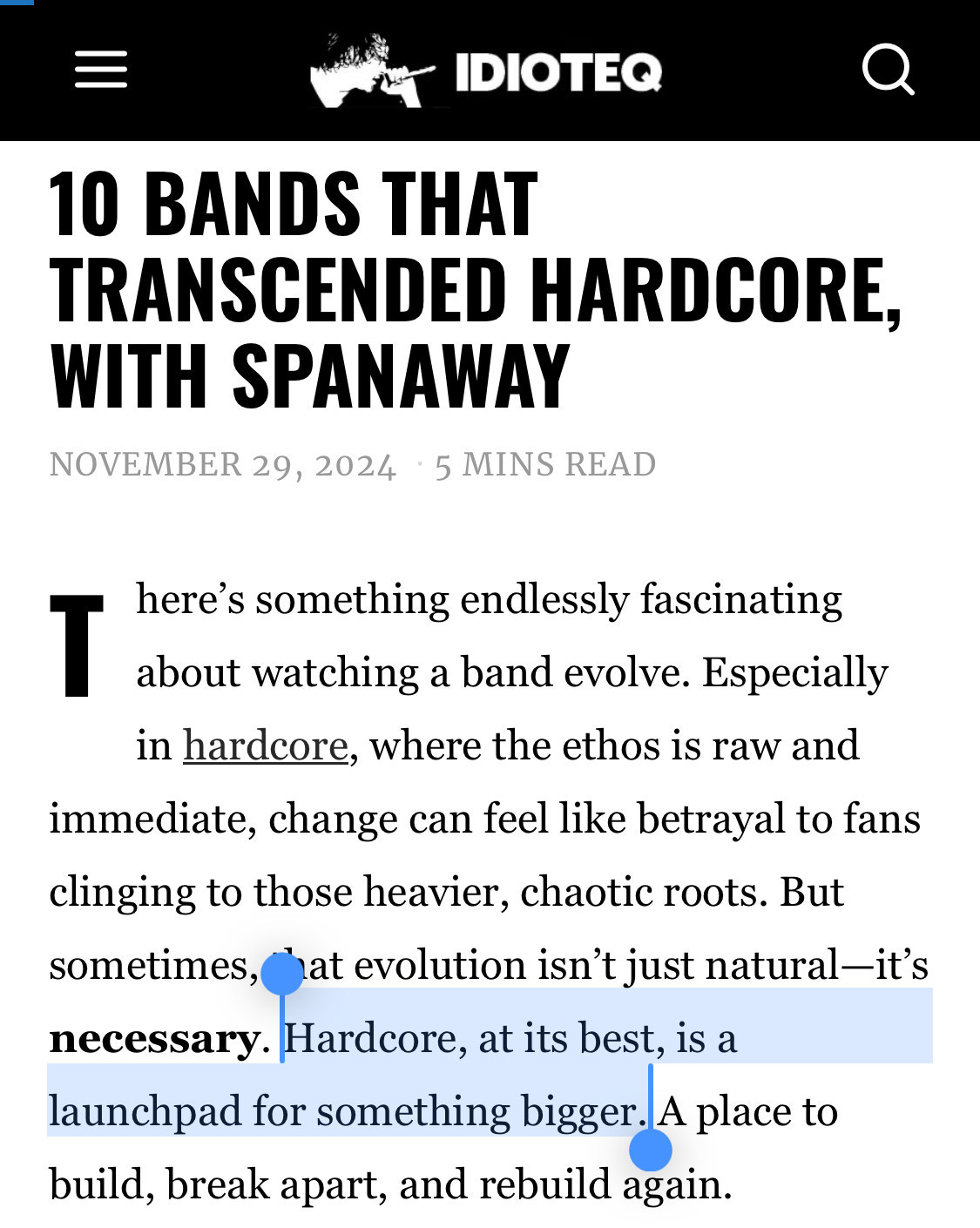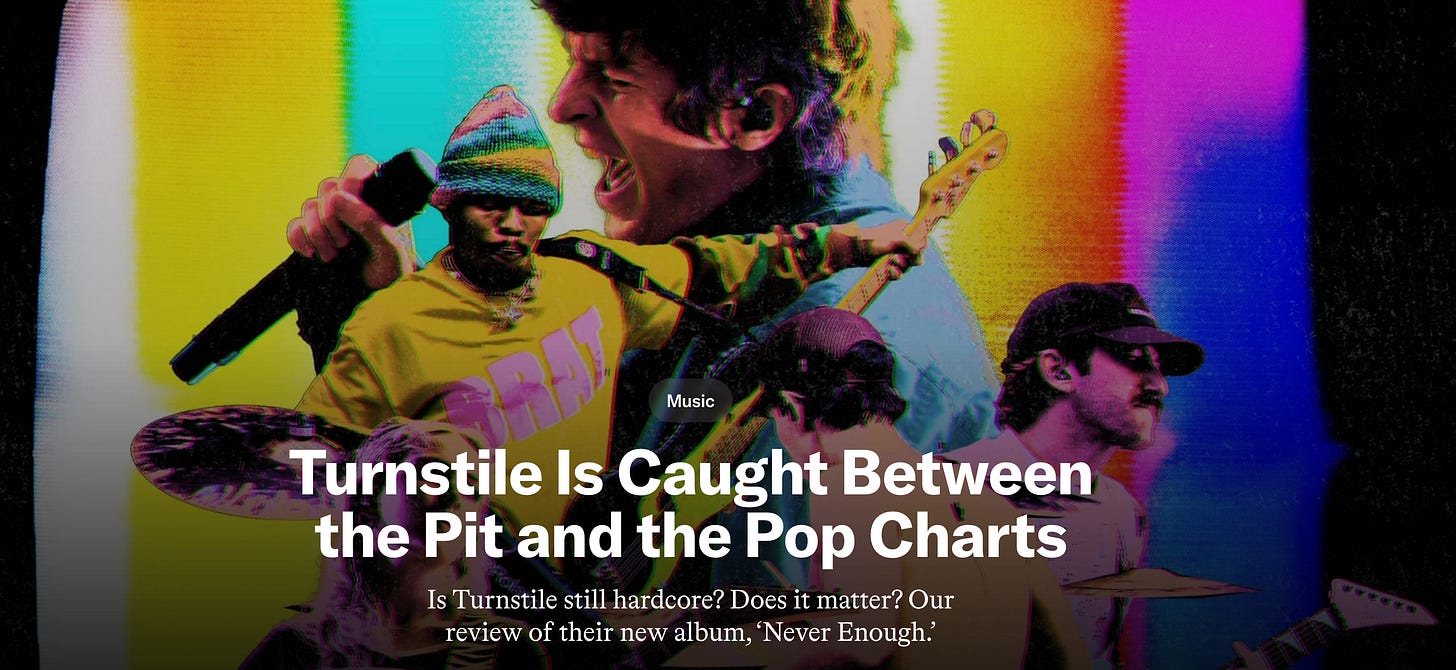The new Turnstile record is out which means a plethora of articles attempting to explain hardcore to civilians as well as endless pontification about Turnstile’s place in it. In fact it seems like for all the alt-hardcore bands who get press coverage, that’s the recurring narrative: are they still hardcore?
Is this really the most interesting angle music journalists can come up with?
The LA Times goes right for it in their recent interview with Brendan of Turnstile:
I have literally never heard anyone ever say Turnstile has ruined hardcore in real life.
I’m convinced the 2025 music journo just preps by spending 20 minutes in the hateraid bog that is /hardcore on Reddit to form their outlook. Is it just laziness or are they trolling us for clicks? It’s impossible to tell nowadays if I’m reading a real attempt at music journalism or if it’s a clown-shoe, click-bait ass site trying to hawk me an exclusive color variant. Speaking of Brooklyn Vegan, they mentioned “hardcore” nine times in their Turnstile review and inevitably posed the question are they still hardcore? Then of course they posted a video telling us we need to stop asking if they’re still hardcore.
NME and The Guardian matched them with nine “hardcore” mentions of their own.
Lambgoat only mentioned “hardcore” six times in the middle of a pretty scathing review (“When it hits it hits, and it's great, but those moments are NEVER ENOUGH.”) Damn, sick burn, bro. Pitchfork went as far as comparing Turnstile to anarcho punk legends Crass ("both bands share a DIY ethos: the belief that communal self-determination is the root of broader change.")
What’s are we doing here, people?
Even some dudes who seemingly know better are falling for this lazy narrative. Eli Enis does a good hardcore podcast called Violent Treatment but his Turnstile article is just as lazy as those from folks who have never heard the Breakdown demo or the words Designated Mosher’s Unit uttered in succession.
Again, who and where are these angry hardcore purists? Do they exist in the real world? Are they in the room with us right now?
The Skinny said a similar thing: “…they once again attempt to push the boundaries of what a hardcore band can sound like, can be. Purists will scowl, millions will lap it up.”
I mean, if we are tossing out the label “hardcore purist,” I probably qualify. There are hundreds of hours of me talking about hardcore on 185 Miles South and thousands upon thousands of words I’ve written in this Substack about it. I talk to like-minded folks about HC on the reg and no one is mad at Turnstile. Everyone seems to legitimately wish them the best and when they come up in conversation, it’s generally about these ridiculous narratives journalists hang around their neck or simply who we hope they take on tour.
Onto the the next question:
Are they biggest hardcore band ever? That depends on what you think hardcore is and really that’s up to YOU to decide.
Consider this: Beastie Boys were a legitimate hardcore band at one point and then they weren’t. Even their 1994 LP Ill Communication has two pretty killer hardcore songs on it. Where’s the Beastie Boys are the biggest hardcore band of all time narrative? The Goo Goo Dolls have ~32,000,000 listeners on Spotify (about 10 times the size of Turnstile’s legit massive number). You ever jam their first record? Their song “Hard Sores” is more hardcore than almost anything that gets sent to me by hardcore band publicists. Why aren’t these underground-to-mainstream success stories getting name checked in articles? It’s always just the Bad Brains mentioned, who are undoubtedly one of the greatest hardcore bands of all time but never successfully crossed over into the mainstream, despite inking a major label deal in the 1990s.
Why is it that when it comes to bands of hardcore punk’s past we can have some levity in describing what they are, what they sound like, how they evolved and what they became? The Beastie Boys, The Goo Goo Dolls, and yes, Turnstile all got popular because they tapped into more popular genres of music outside of hardcore punk. Is that really pushing the boundaries of hardcore or just playing something else? What’s so wrong with evolving into something else anyway?
Is the only thing interesting about bands like Turnstile, Scowl, Militarie Gun, etc. their connection to the underground? It can’t be, can it?
What in the hell is even this? Send the BS histories of hardcore straight to the bin. Talk the bands, their tunes, and what makes them special.
And of course there was this at the end of last year. After sitting with it for half a year, unfortunately I think it’s the sentiment amongst most music journalists. They want to talk about hardcore without ever having to actually listen to it or give it the historical respect that it deserves. The real thing remains a secret to the masses and folks who pretend to cover it.
6/12/25 UPDATE: Since I originally posted this, The Ringer has thrown their hat in the ring, bodying everyone else with over 20 mentions of “hardcore” in their article and even quoting Reddit posts. Shoutout to The New Yorker who wrote a really good piece, albeit with a shitty headline. It’s a shame they employ that giant piece of shit David Frum.
If you enjoy the podcast or this blog, consider becoming a patreon. The patreons keep this project alive. Thanks for the support.
- ZN











1990 is calling again.
Walter bore the brunt of the ire then. I love Quicksand and obviously they were all hardcore kids but I don’t think I ever considered them a hardcore band.
Hardcore kids can play in non-hardcore bands. They are still excellent people who make great music but are just not playing underground music for an underground scene. They can’t even take their friends that still play in hardcore bands on their big tours. It still doesn’t make them a hardcore band.
Most music journalists in the 2020’s are just lazy hacks. I’ve lost count of the amount of times I read some piece about a a punk/HC/underground band or scene by someone who never bothered to do their homework.
People hate change. And they really hate it when it happens to something they love because they don’t think the things they love can change. That and it’s human nature to try to make sense of everything, put definition to everything for a sense of understanding — instead of simply existing and experiencing things. It seems like in many cases, people will spend more time seeking to define something than they will actually experiencing the thing.
The irony to me is that the spirit of punk is rooted in an attitude of doing what you want, because you want to. It’s not about labels, it’s about passion. So to your point here, it’s just reductive to try to label or define whether they are still a “hardcore” band. Because if you don’t like it, you can just not listen and move on with your life. They’re doing what they WANT to do.